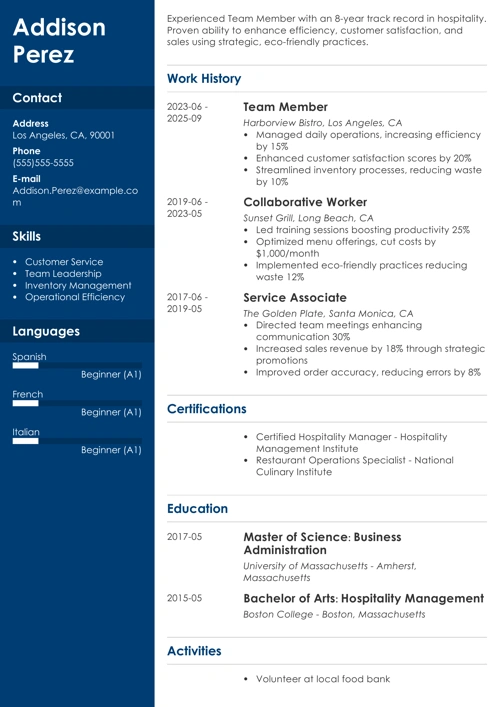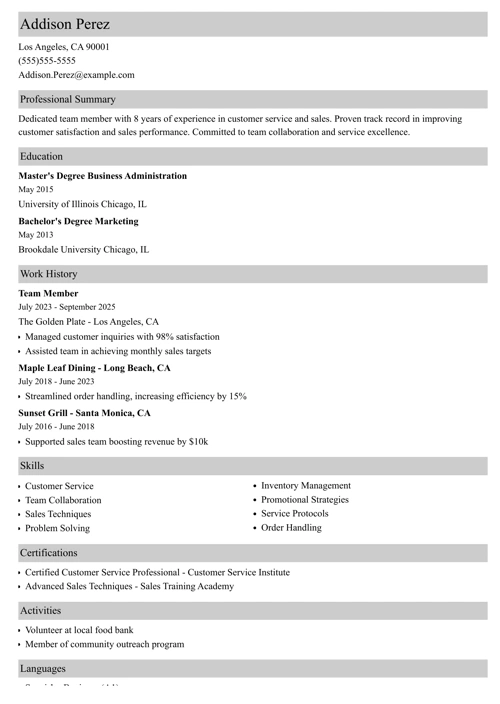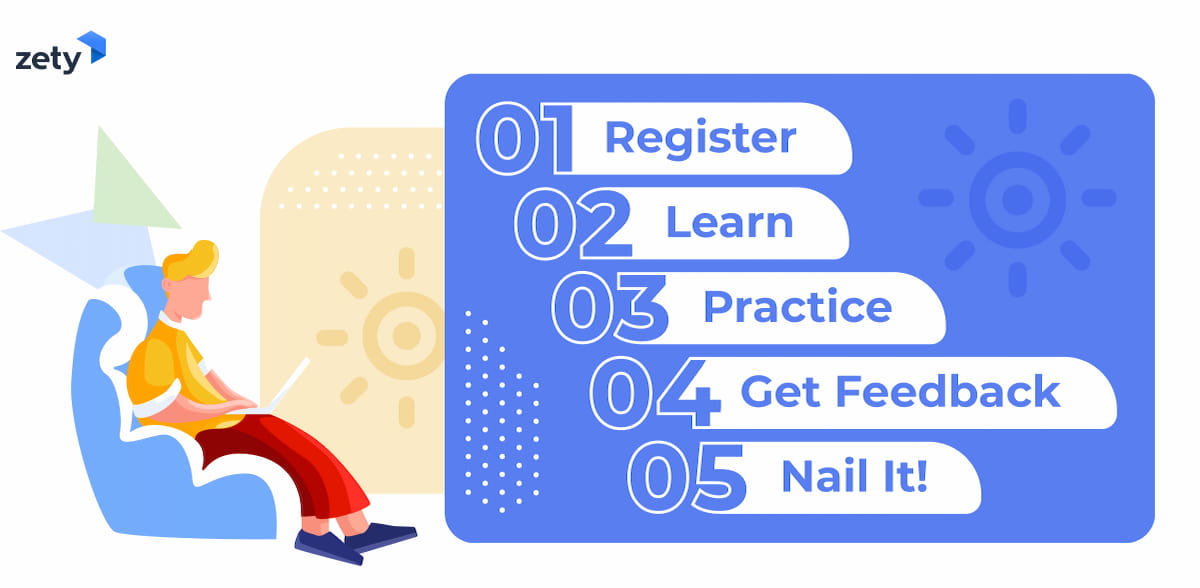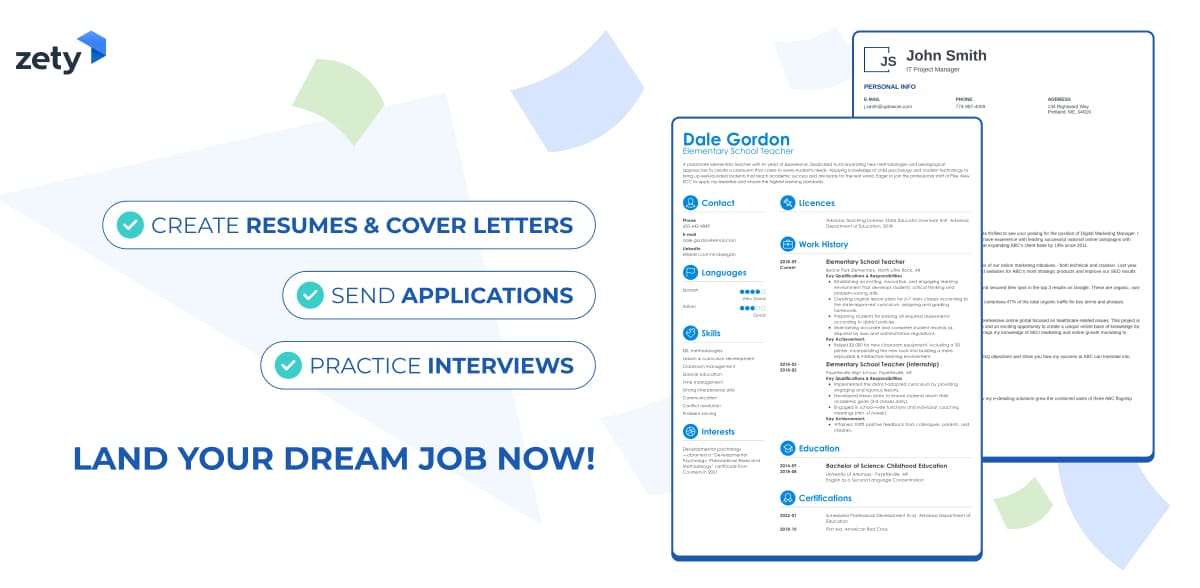What are your weaknesses?
Yes, the dreaded greatest weakness interview question. The last thing you want to do at an interview is to say that you are bad at something.
Good news: you can answer the “what are your weaknesses” job interview question without sabotaging yourself. And—hint—it does NOT involve pretending that being a perfectionist is one of the good personal weaknesses for job interviews.
This article will show you:
- Examples of weaknesses for job interviews and how to improve upon them.
- What an interviewer wants to hear when they ask the biggest weakness interview question.
- How to answer the what are your weaknesses interview question.
- Samples of “what is your weakness” best answers.
Do you want to hear you’re hired? Then start practicing with expert interview coaches now. Get access to a mock interview tool, use an impressive questions library to record your answers, and receive instant feedback. Don't let another opportunity pass you by.
Turn your next interview into a dream job offer.
If you are looking for more guides to get ready for your interview, check these:
- How to Answer "Tell Me About Yourself"
- How to Answer "How Do You Handle Stress and Pressure?"
- How to Answer "What Makes You Unique?"
- How to Answer "Where Do You See Yourself in 5 Years?"
- How to Answer "Please Tell Me Something That’s Not on Your Resume"
- How to Prepare for a Phone Interview
- Best Questions to Ask in a Job Interview
- Popular Situational Interview Questions and Answers
- Resume Examples & Writing Guides for Any Job
Why Do Recruiters Ask About Your Weaknesses at Job Interviews?
The popular job interview “weakness” question interview question may come in different forms:
- What is your greatest/biggest weakness?
- What are your strengths and weaknesses?
- What are your weakest skills?
- What would your current boss say is your weakest area?
- Tell me about a time you failed.
- Describe a difficult work situation and what you did to overcome it.
Even though focusing on an employee’s strengths can boost sales and engagement, and focusing on weaknesses can drag organizations down, hiring managers still tend to ask this interview question.
So, what does the interviewer want to find out by asking that question? They may be trying to see how self-aware you are and if you know how to control your ego and discuss uncomfortable topics. They may also be checking if you care about personal and professional development and have a strategy to improve your weaknesses.
Recruiters may ask you plenty of different interview questions. Check out the most popular ones in our guide: Common Interview Questions and Answers
15 Good Weaknesses for Job Interviews
Here’s a list of typical weaknesses for a job interview. Use it when preparing yourself to answer the questions on your biggest weaknesses.
1. Delegating Tasks
Difficulty delegating tasks originates from a need for control or a lack of trust in others. It can create a heavy workload, hinder team cooperation, and reduce overall project efficiency.
Recognize the importance of collaboration and building trust with colleagues. Share instances where you successfully delegated tasks, highlighting your commitment to improving your teamwork skills.
2. Multitasking
Multitasking involves handling multiple tasks simultaneously. While perceived as a valuable skill, research suggests it can decrease overall efficiency, leading to errors and decreased quality of work.
Highlight your awareness of the importance of prioritizing tasks and share steps you've taken to enhance time management skills. Emphasize instances where a focused, one-task-at-a-time approach resulted in higher-quality outcomes.
3. Disorganization
Disorganization is a lack of order or structure in managing tasks and information. This can lead to missed deadlines, lost documents, and overall inefficiency in the workplace.
Acknowledge the importance of staying organized at work and discuss specific strategies you've implemented, such as using to-do lists or organizational tools. Share success stories that demonstrate your ability to manage work effectively.
4. Fear of Public Speaking
Anxiety or discomfort when speaking in front of an audience can hinder effective communication, limit professional growth, and impede the ability to share ideas convincingly.
Highlight efforts to improve your public speaking skills, such as attending workshops or practicing with colleagues. Emphasize your willingness to learn and grow in this area, positioning it as a continuous journey toward improving your skillset.
5. Impatience
Impatience manifests as difficulty staying calm and focused when faced with delays. This can lead to frustration for oneself and colleagues, potentially hindering collaboration and creating a stressful work environment.
Convey your awareness of the importance of staying patient and share stress-management strategies you've implemented to manage impatience, such as meditation or yoga. Highlight instances where your patience positively impacted project outcomes.
6. Weak Communication Skills
Weak communication skills encompass written and verbal communication challenges, potentially leading to misunderstandings, ineffective collaboration, and suboptimal project outcomes.
Acknowledge the need for improvement in communication skills and discuss steps you've taken, such as attending workshops or practicing with colleagues. Emphasize your openness to feedback and commitment to continuous improvement.
7. Time Management
Difficulty managing time effectively can result in missed deadlines, increased stress, and decreased work productivity and motivation. It may also lead to a lack of balance between work and personal life.
Acknowledge the challenge of effective time management skills and discuss specific steps taken to improve, such as using time-tracking tools or creating schedules. Emphasize your commitment to continual learning and growth in this crucial area.
8. Presentation Skills
Weak presentation skills involve challenges in delivering information convincingly, which can impact professional credibility, hinder effective knowledge transfer, and limit career advancement opportunities.
Recognize the importance of presentation skills and share efforts to improve, such as participating in relevant training or seeking mentorship. Highlight instances where enhanced presentation skills positively influenced project outcomes.
9. Procrastination
Procrastination is the habit of delaying tasks, leading to missed opportunities, increased stress, and potential damage to professional reputation. It can decrease overall productivity and hinder meeting your career goals.
Demonstrate awareness of the importance of time management and share specific strategies you've implemented, such as setting deadlines or breaking down tasks. Highlight successes that showcase your ability to manage time effectively.
10. Difficulty Asking for Help
Difficulty seeking assistance may stem from a fear of appearing incapable or wanting to handle challenges independently. This can lead to prolonged problem-solving, potential errors, and a lack of collaboration.
Acknowledge the importance of seeking help when needed and share instances where you successfully collaborated with others. Emphasize your commitment to fostering a supportive and collaborative work environment.
11. Excessive Attention to Detail
Excessive attention to detail involves focusing on minutiae, potentially leading to perfectionism, delays, and an inability to see the broader picture. This can impact efficiency and hinder timely project completion.
Recognize the importance of balancing attention to detail with efficiency. Share strategies you've employed to manage workload effectively while maintaining high standards. Highlight instances where this approach resulted in successful project outcomes.
12. Difficulty Saying No
Difficulty saying no arises from a desire to please others or fear of disappointing colleagues. This can lead to an overloaded schedule, increased stress, and a compromise in the quality of work as one may struggle to manage multiple commitments effectively.
Acknowledge the challenge of setting boundaries and express your commitment to improving. Share strategies you've employed, such as time-blocking or learning to prioritize tasks. Highlight instances where saying no positively impacted your ability to deliver high-quality work.
13. Being Too Honest
Excessive honesty involves an inclination to share opinions candidly, potentially leading to unintended conflict, hurt feelings, or damage to professional relationships. This weakness may stem from a desire for transparency but needs careful management in a professional setting.
Recognize the importance of diplomacy and share efforts to balance honesty with tact. Discuss instances where your honesty positively influenced decision-making or problem-solving. Emphasize your commitment to improving your communication style while maintaining transparency.
14. Difficulty With Letting Go of Projects
Difficulty letting go of projects can stem from a strong personal investment in one's work, making it challenging to delegate or transition tasks. This may increase the risk of burnout, hinder team collaboration, and limit career growth opportunities.
Acknowledge the challenge of relinquishing control and express your commitment to developing this skill. Share instances where you successfully transitioned projects to colleagues, highlighting the positive outcomes of effective delegation. Emphasize your understanding of the importance of teamwork and shared responsibility.
15. Balancing Work and Personal Life
Keeping a healthy work-life balance is crucial for your mental health and avoiding the risk of burning out. Taking on too many tasks and responsibilities at work is a recipe for decreased overall productivity and an increased likelihood of mistakes. Poor work-life balance is one of the top reasons people quit their jobs. Maintaining a proper work/life balance is especially challenging if you work remotely.
Discuss strategies you've implemented to prioritize self-care, set boundaries, and carve out time for personal pursuits. Highlight instances where achieving balance positively impacted your performance and professional satisfaction, emphasizing your understanding of the significance of maintaining a healthy equilibrium between work and personal life.
Strengths and weaknesses go hand in hand. Need help identifying yours? Read our guides: How to Answer the “What Are Your Strengths?” Interview Question (Examples) and List of Top Strengths to Put on a Resume
Join other members in mastering the know-how behind the pre-interview stage. Use the practice set tailored to your experience level and find out what to improve. You’ll feel instantly ready to nail your next interview.
Connect with interview coaches today. You’ll know you did a good job when you’re done.
How to Answer the “What Are Your Weaknesses” Interview Question
Describing strengths is a piece of cake compared to admitting your own flaws. Here’s how to answer the “what are your weaknesses” interview question:
1. Make a List of Weaknesses
First, you’ll want to list your personal and professional weaknesses before the interview. Ask yourself the following:
- Is there a task or work-related skill that I don’t like to do/don’t do well/don’t have?
- Was there a time when I failed at work (and corrected it)?
- Did my supervisor ever point out that I needed to work on something (and then praise me when I fixed it)?
- Did anyone ever criticize me for working in a particular way?
- Did I ever have any academic weaknesses? Was there anything problematic for me when I was studying?
2. Study the Job Ad
Next, go to your job offer. What crucial skills can you single out? Here’s an example of a job offer for a server at a restaurant:
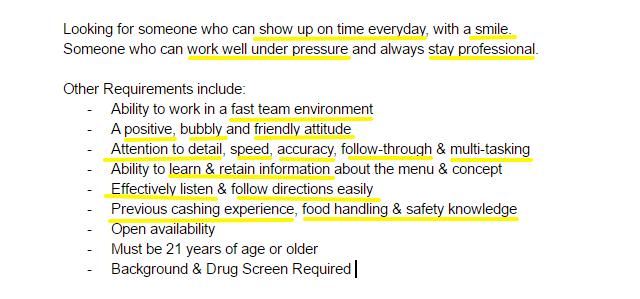
Important skills come down to:
- Punctuality
- Positive attitude
- Ability to stay professional in a fast-paced environment, multitasking
- Collaboration skills
- Fast learning, diligence
- Good listening skills, and the ability to comply with instructions
3. Compare the Lists
Now that you have two lists in place, look at them together. Your answer to the what are your weaknesses question is the only time you’ll want to avoid matching skills from the job offer. Instead, choose weak skills that are not essential for the job, like here:
What Is Your Greatest Weakness: Answer Sample
| RIGHT |
|---|
| One of my biggest weaknesses is that I can’t sit still and focus for extended periods of time. I was never a bookworm. I always preferred athletics and hands-on activities. To make sure that I got through school with good grades, I set study goals for myself. I would sit still and focus on test materials for thirty minutes. After, I would reward myself with a break to run around or socialize. The system taught me discipline and helped me focus. I graduated from high school with honors. I am now attending college on an athletic scholarship. |
Firstly, the candidate doesn’t disguise the weakness but does mention strengths as they go along. Secondly, it’s obvious what they did to address the weakness (and that the steps led to a successful outcome).
What Is Your Greatest Weakness—Example of a Wrong Answer
| WRONG |
|---|
| I have anger management issues. I tend to blow up when someone makes me angry or nervous. I guess you can say I’m the opposite of Little Miss Sunshine. Don’t get me wrong. I like people. But I’m a grumpy person. I don’t have a high tolerance for nonsense or stupidity. I’m working on it, though. I’ve been doing volunteer work with seniors to develop patience and empathy. I have a couple of regulars who are as grumpy as me, and we get along fine. |
The job offer states that the ideal candidate should be “positive, bubbly, and friendly.” If that’s not you, you’re not qualified for this job. If you’re going to fake it until you make it (i.e., you need the job), don’t mention that you’re Oscar the Grouch.
4. Be Honest and Demonstrate Self-Awareness
Lying on your resume or during a job interview is a bad idea, and it’s absolutely futile. Don’t disguise a strength as a weakness—this old trick may have the opposite effect and seem like you’re just showing off.
Also, don’t deny that you have any weaknesses. Some candidates will hear the “what are your weaknesses” question and freeze. They panic and deny that they have any. Doing so is one of the worst mistakes you can make. An ideal candidate will choose a real weakness and discuss how they manage it.
Good Answer To What Is Your Greatest Weakness
| RIGHT |
|---|
| I’m not very good at gauging how long a task will take me to finish. I quite often underestimate the time it will take to do smaller jobs. The result is that I don’t allocate enough time to larger, more significant projects. I have to rush to get things done. Sometimes I miss deadlines. I’ve started taking time management courses at my local community college to address the issue. |
5. Don’t Overshare
You are not confessing your sins or discussing childhood experiences with your therapist. Some things are better left unsaid (like your unyielding desire to skip work because you can’t get out of bed).
Bad Answer To What Is Your Greatest Weakness
| WRONG |
|---|
| I hate animals. I hate animals so much that I yell at my sister’s dog when she isn’t around to hear it. I don’t know why I hate animals so much. I suspect it comes from when a seagull ate my taco. That bird swooped down and ate a taco out of my hand. I’ve never been the same since. I don’t know what to do about it. |
6. Craft a Perfect Answer That Also Shows Strengths
One of the best pieces of interview advice is using the STAR method. It’s an effective way to demonstrate that your measures are working. And don’t just use it for the what are your weaknesses question—you can use it to answer just about any typical interview question!
STAR stands for Situation, Task, Action, Result:
- Situation: Start by explaining a situation requiring you to solve a problem, use a skill, or develop a new idea.
- Task: Explain the action that your job requires in such a situation.
- Action: Describe the action that you took. If it’s different from the required task, you should also explain why you chose a different path.
- Result: How did the situation play out once you acted? It’s best here to illustrate successes with numbers and details if you can. Numbers help reinforce the impact that your action had.
7. Talk About How You’re Addressing the Issue
An important part of your “what are your weaknesses” answer is showing self-improvement. You should include details about the steps you’re taking to learn a skill or correct a weakness. A good answer to the “what are your weaknesses” question should have two parts: the weakness and what you’re doing to correct it.
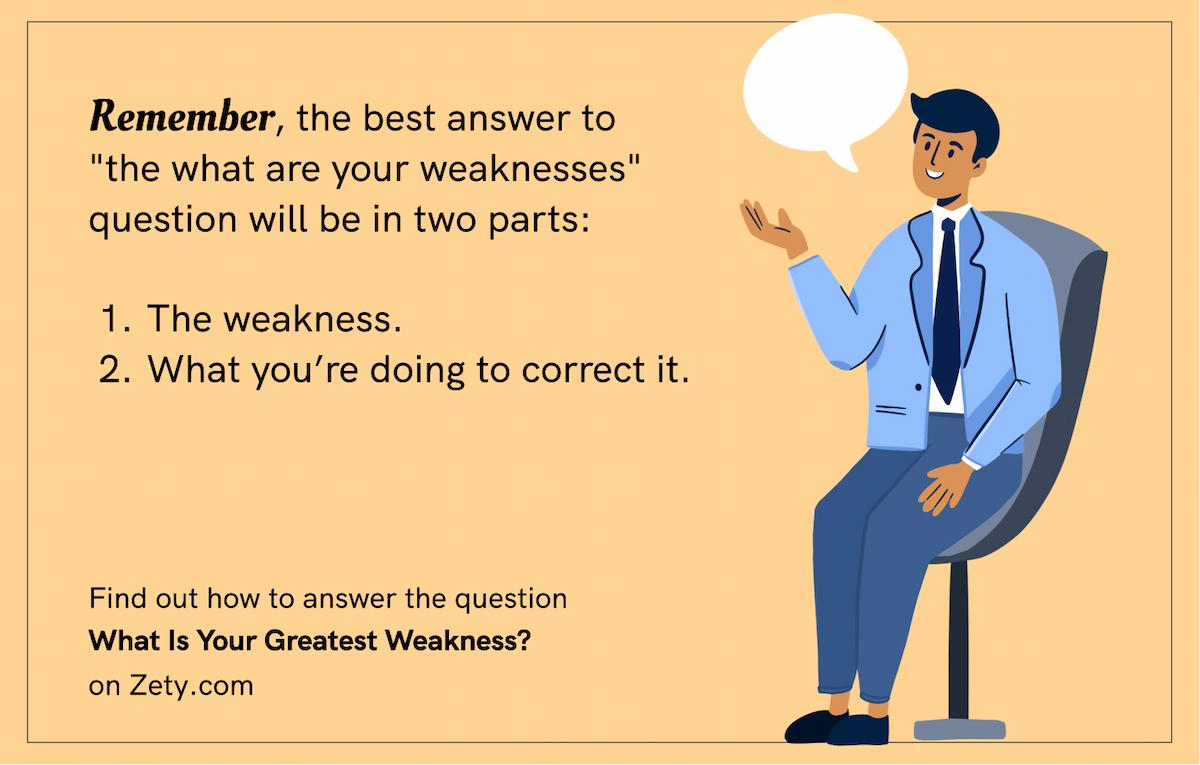
Consider these tactics to improve your weakness:
- Enroll in a class
- Get training (internal/external)
- Join groups or workshops
- Do volunteer work or activity outside of work that uses the weaker skill
- Get help from a mentor or advisor
- Find tools that help correct the weakness
Sample Best Answer for What Is Your Greatest Weakness
| RIGHT |
|---|
| I have two greatest weaknesses. The first is my inability to share responsibilities. The second is the desire to be in control. I don’t trust others during group projects with work I know I can do better. So, if I have to share a task, I lose my patience when I suspect that the other person isn’t doing it right. I’ve discussed these weaknesses with my supervisor as areas I’d like to improve. We’ve set up a timeline and goals for me to achieve. I’ve enrolled in several team-building workshops and a volunteer group. I’m learning to let go and trust others. My supervisor complimented me on my progress. |
Interview over? Don’t forget to send a “Thank You” email: How to Write a Thank You Email After an Interview (+10 Examples)
Getting ready for an interview? That’s great! How about finding even more opportunities? The best way to apply is with a resume created in our auto-fill resume builder. Attach a professional cover letter from our cover letter builder to create an irresistible duo.
Make a resume template and a cover letter template work together, and get ready for your incoming interviews!
Key Takeaway
Yes, sometimes the interviewer will try to catch you off guard with an interview question that isn’t fair. And yes, “What are your weaknesses?” or the very similar “What is your greatest weakness?” are some of the worst.
Remember:
- Answer "What is your greatest weakness?" with a skill that is not essential to the job you’re applying for. Explain what you're doing to improve.
- Some examples of "good" weaknesses for a job interview include self-criticism, difficulty with saying no or delegating tasks, public speaking, etc.
- Don’t stress and give an honest and constructive answer. Remember, you’re only human.
About Zety’s Editorial Process
This article has been reviewed by our editorial team to make sure it follows Zety's editorial guidelines. We’re committed to sharing our expertise and giving you trustworthy career advice tailored to your needs. High-quality content is what brings over 40 million readers to our site every year. But we don't stop there. Our team conducts original research to understand the job market better, and we pride ourselves on being quoted by top universities and prime media outlets from around the world.


